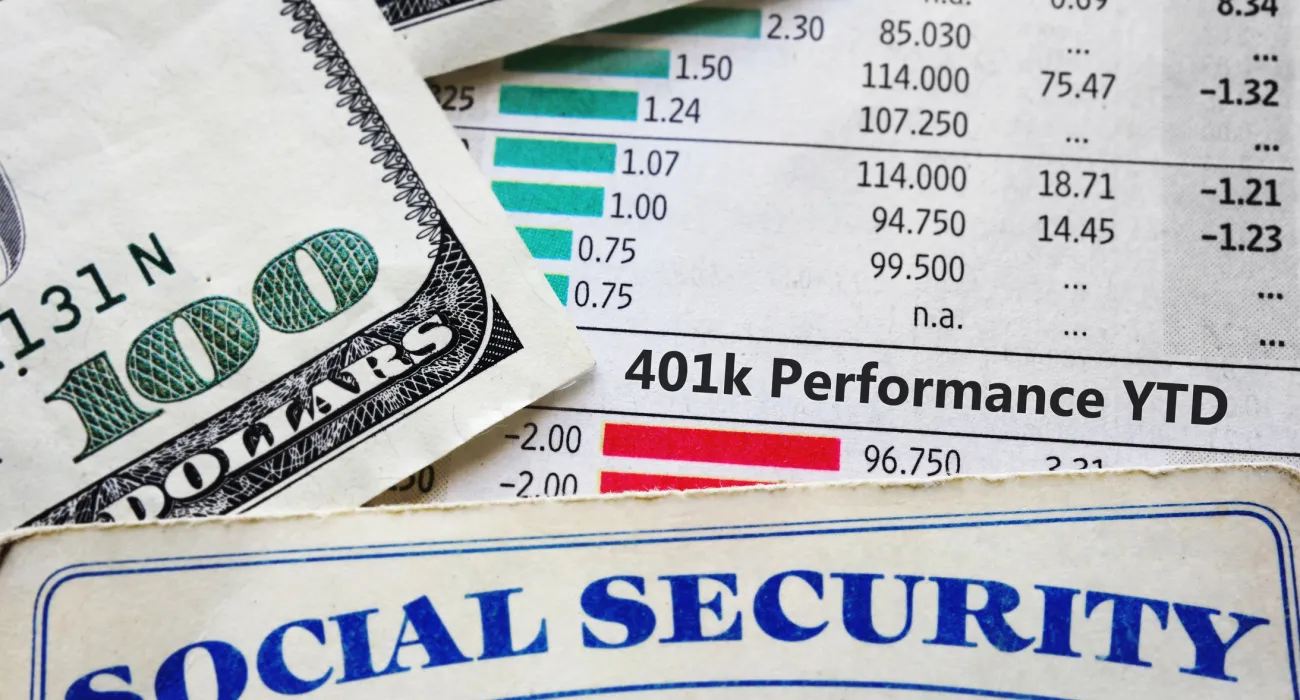Did you know that one way to get a higher Social Security payout
is to use your savings? In essence, each year that you wait to collect, you
will receive an 8% increase, which can add up to a lot more money in your
pocket. You certainly want as much income per month as possible and one
interesting approach is drawing from your 401(k) account while delaying
claiming Social Security since the monthly benefits increase the longer you put
off taking it.
Using a 401(k) account as a bridge to Social Security is gaining popularity with people who have enough money saved up that it can tide them over until they can claim the maximum Social Security payout at the age of 70 years old. However, there are still a plethora of people who are reluctant to utilize what they consider their long-term nest egg for short term usage. Running out of money is one of the biggest fears amongst retirees. They often question how they're going to make it last. That's exactly where delaying your Social Security benefits payout can help you.
Waiting Literally Pays Off
The bottom line is that waiting to claim your Social Security benefits means that the monthly payments will be a lot higher when you do claim them. For example, if you claim your benefits at 70 years old instead of 65 years old, you will gain a 40% increase (8% per year times 5 years = 40%). So, if your Social Security payout at 65 years old is $1,500 per month, it will increase to $2,100 per month at 70 years old. That's a $600 per month difference. Just think about what you could do with an extra $600 per month.
If you can utilize your 401(k)-retirement account instead, your payout will increase by a minimum of 78%. So, if your Social Security payout at 60 years old is $1,500 per month, it will increase to $2,670 per month at 70 years old. That's a difference of a whopping $1,170 per month. That's most likely more than you will gain from your investment accounts. This holds particularly true since people who are at or near retirement age are usually far more conservative regarding risk. Something else to consider is the fact that Social Security benefits are not negatively affected by sudden downturns in the market or the economy.
In essence, Social Security pays out the rest of your life, which is even more reason to avoid taking it early and being locked into the lowest payout tier. This will ensure your Social Security benefits will never run out. On the other hand, your 401(k) account and other retirement accounts only have a specific amount of money in them. That means the money could run out at some point during your retirement.
The Concept Is New
The concept of delaying the claiming of your Social Security benefits until the age of 70 years old and using money from your 401(k) account instead is new. Meaning it's also a bit slow to catch on, even with the masses of people who decided to retire early during the Covid pandemic. One reason why the concept is so new is because you are the first generation where 401(k) accounts all but replaced pensions. In the past, employees relied on their pension plan money during retirement years.
Some People Are Nervous About Spending 401(k) Funds
There is another reason why the bridge concept is slow to take hold across the United States. People in general are under the belief that their 401(k) fund is only there in case of emergency. They're reluctant to spend any of it and some individuals baby their retirement accounts like they would a child or pet. Even the very thought of depleting it can be daunting. People spend their entire working years saving for retirement and it can be incredibly difficult to start thinking in the reverse.
In essence, you need to get used to the idea that you're going to live off your savings. That means you're subtracting from your savings instead of adding to it each month. There certainly is a physiological element to that. However, you need to realize that your 401(k) account is not emergency money, and that it can be used to invest in yourself. You'll make more money in the form of significantly higher monthly Social Security payments.
Can Employers Help?
Financial experts are now suggesting that companies can make it easier on their employees by having the businesses handle the logistics of using 401(k) accounts to maximize future Social Security payments. In essence, the employers would have the ability to draw money from the retired employees 401(k) accounts so they could provide them with an amount of money that's equal to what they would otherwise receive from their Social Security benefits. This would provide retired employees with the option to painlessly delay claiming Social Security benefits until they're 70 years old and can claim the maximum monthly payout.
The best part is there wouldn't be any additional costs to the businesses, except for the extra paperwork. There are no regulatory reasons why this can't be accomplished. In fact, it could be considered as another benefit that companies can offer to attract prospective employees, which is necessary in the tight labor market that we're currently experiencing. As more employees and potential employees become aware of and fully understand this strategy, there will be a demand for it.
According to a recent study conducted by Gal Wettstein, a senior research economist at the Center for Retirement Research at Boston College, nearly half of 50-65-year-olds who were surveyed claimed that they would take full advantage of a 401(k) bridge if their employer offered it. The study consisted of 1,349 people who had a 401(k) balance of $25,000 or more, which is the minimum amount of money that participants would need to delay Social Security benefits even for a short period of time.
For example, employees who retire at 62 years old, and draw $1,900 per month from the 401(k) accounts to cover the delay of Social Security benefits would need to draw $23,000 per year from their retirement accounts. The vast majority of participants in the study had not previously heard of the concept. However, it's absolutely something that anyone can do on their own right now. You just need to sit down and calculate what your Social Security benefits would be if you delay claiming them, or if you don't delay claiming them.
It makes sense to speak with a financial advisor about this prior to making any final decisions as they will be able to guide you through the process.
There Are a Few Downsides
Using funds from a 401(k) account to delay taking your Social Security benefits at an earlier age does have a few downsides. For example, although 38 states in the USA tax retirement distributions, only 13 states tax Social Security benefits. That means if you live in one of those 38 states, you will be taxed for withdrawing from your 401(k) account even at retirement age. In addition, unless you happen to live in one of the 13 states that tax Social Security benefits, you don't have to pay any taxes on that income if you take it starting at 62 years old. So, it's a balance that needs to be calculated carefully.
Once again, you should always consult with a financial planner and or financial expert before making any final decisions as to whether to use your 401(k) account to delay claiming Social Security benefits. One thing to remember is you cannot leave your Social Security benefits to your heir or heirs unless it's your spouse. Even then, your spouse will only be paid your benefits or theirs, whichever is higher. However, you can leave your 401(k) account to your heir or heirs. So, if you tap into your retirement account to avoid claiming Social Security when you're under 70 years old, you'll end up leaving less money to your beneficiaries.
There are people who think they may not live long and or will require expensive long-term care that would rather have cash on hand in the form of a 401(k) account. Others worry about financial based emergency situations, and some people don't have a lot of money saved up for retirement. These are all good reasons to avoid drawing from your 401(k) account. However, if you have $100,000 to $250,000 in investments and savings including your 401(k) account, experts consider this to be the perfect figure for drawing from your retirement to delay collecting Social Security.
That way you won't need to be nearly as concerned about running out of money in your retirement years. Plus, drawing from a 4019(k) account to delay claiming your Social Security benefits protects you from running out of money. You'll have a significantly higher monthly Social Security payment that will never run out during your lifetime.
If you would like to receive more information on making smart money moves for your future, be sure to contact us today!




